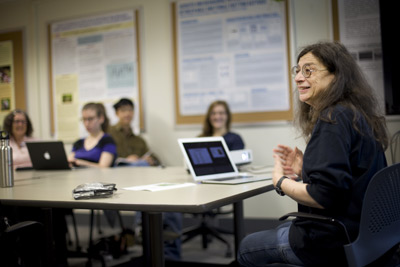Insect expert bugged by the lack of women in entomology
By Elisabeth Rosen

When Edith Patch (1876-1954) became head of the entomology department at the University of Maine in 1904, male colleagues protested that "she would not be able to climb a tree or catch a grasshopper," said May Berenbaum, Ph.D. '80, an entomologist and department head at the University of Illinois, speaking on campus April 3 as part of the two-day Frontiers Symposium that featured eight leading women life scientists.
Nevertheless, Patch went on to have a distinguished career, Berenbaum said, that included being the first woman elected president of the Entomological Society, proving that women could succeed in the field.
Berenbaum's interest in the history of female entomologists was triggered by "this obnoxious term 'father,'" she said. While male scientists who make pioneering discoveries are often referred to as a "father" of their fields, there are no such "mothers."
Yet women have made significant contributions to the field of entomology as far back as the 19th century, she said. Margaretta Hare Morris (1791-1867), who was elected to the Academy of Natural Sciences of Philadelphia in 1850, published descriptions of the Hessian fly and 17-year locust. Eleanor Ormerod (1828-1901), the sister of a well-established entomologist, "never complained about discrimination," Berenbaum said. "She even wrote: No one owes more to the help of man than myself."
In the early 20th century, with the rise of the women's rights movement, female entomologists began to assert their presence more strongly, Berenbaum said. At a regional entomology meeting in 1924, one in 12 attendees was a woman. But after World War II, with the GI Bill and the resulting "influx of GIs," entomology training programs once again were predominantly male.
"There were not a lot of women in the postwar years," Berenbaum said. "And the shift in emphasis in the field was to chemistry, which was already a male-dominated discipline."
Today, 12.5 percent of entomology department heads are women. Berenbaum attributed this low count to a deep-seated prejudice about entomology that has pervaded American culture. When Lawrence Summers, Harvard's former president, commented that "women tend to avoid fields with a low social component," he included entomology as an example -- even though there is no logical reason to assume that entomologists are particularly anti-social, she said.
One reason girls may not express interest in entomology, Berenbaum said, is "the gross factor." While little girls love playing with bugs, by middle school they have become socialized to express disgust for creepy-crawly things. "I don't know what happens in middle school," Berenbaum said, "but I think that's where we lose them."
And although women have not been called "mothers" in the scientific literature, Berenbaum has unearthed frequent references to female entomologists as goddess figures: Maria Sibylla Merian (1647-1717) was compared to Minerva, goddess of wisdom; Ormerod was called a "Demeter of the 19th century"; and Berenbaum herself has been referred to as "entomological goddess" in a book blurb.
"I guess we've come a long way," Berenbaum said. "Maybe we're not mothers, but maybe goddess isn't so bad after all."
Other symposium discussion topics included neuroscience and oceanography and such general topics as "Beyond the Lab Coat: Family and Community" and "Solving the Two Body Problem: Making Career Decisions with an Academic Life Partner." As part of the symposium, each visiting scientist gave a plenary lecture on their research and interacted with students, postdoctoral researchers and faculty in small gatherings and panel discussions.
The symposium was supported by the President's Council of Cornell Women, CU-ADVANCE, the Office of the Vice Provost for Research, the Graduate School, the Boyce Thompson Institute for Plant Research and the academic host departments.
Elisabeth Rosen '12 is a writer intern for the Cornell Chronicle.
Get Cornell news delivered right to your inbox.
Subscribe